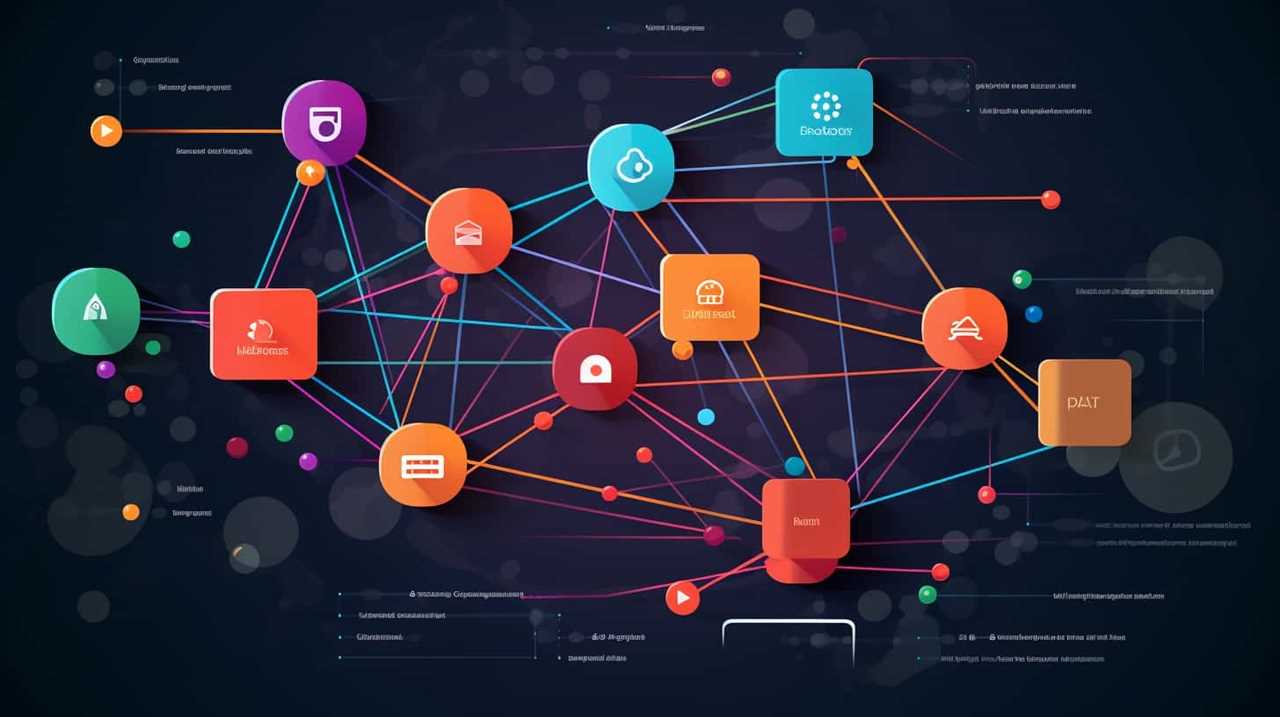Welcome to our article on AI in SEO, where we explore the fascinating realm of predicting the evolution of search engine strategies.
Join us as we delve into the role of artificial intelligence in enhancing search engine rankings, improving user experience, and enabling personalization and targeted marketing.
With AI as our ally, we will also discuss how to anticipate and adapt to algorithm updates, ensuring mastery in the ever-evolving landscape of search engine optimization.
Get ready to unlock the potential of AI in revolutionizing your SEO game.

Key Takeaways
- AI technology revolutionizes website optimization for search engines
- AI enhances user experience by personalizing search results
- AI-driven content optimization and conversion optimization drive higher engagement and conversion rates
- Keeping up with algorithm changes is vital for maintaining online presence
The Role of AI in SEO
How does AI play a crucial role in shaping our SEO strategies?
The answer lies in the intersection of automated content and voice search.
AI technology has revolutionized the way we optimize our websites for search engines. By utilizing machine learning algorithms, AI can analyze vast amounts of data and identify patterns that lead to better search rankings.
Automated content generation, powered by AI, allows for the creation of high-quality, relevant content at scale. This not only saves time and resources but also ensures that websites stay updated with fresh and engaging content.

Furthermore, with the rise of voice search, AI is essential in understanding and responding to natural language queries.
Enhancing Search Engine Rankings
To enhance search engine rankings, we rely on AI technology to analyze data and identify patterns that lead to better rankings. AI plays a crucial role in content optimization, helping us understand what types of content perform well and what keywords are most effective. By utilizing AI algorithms, we can optimize our content to meet the specific needs of search engines and improve our rankings.
Additionally, AI helps us adapt to the rise of voice search optimization. With more people using voice assistants like Siri and Alexa, optimizing our content for voice search queries becomes essential. AI can analyze voice search patterns and help us tailor our content to meet the demands of this growing trend.
By leveraging AI technology, we can enhance search engine rankings and stay ahead of the competition in the ever-evolving digital landscape.

As we focus on enhancing search engine rankings through AI technology, it’s important to also consider the role it plays in improving user experience.
Improving User Experience Through AI
AI technology enhances user experience by personalizing search results based on individual preferences and behavior. Through AI-powered chatbots and voice search optimization, businesses can improve user experience by providing more tailored and relevant information to their customers.
- AI-powered chatbots: These virtual assistants use natural language processing to understand and respond to customer queries, providing instant and personalized assistance.
- Voice search optimization: AI algorithms analyze voice queries to understand user intent and provide accurate and relevant results, making it easier for users to find the information they need.
- Personalized recommendations: AI algorithms analyze user behavior and preferences to offer personalized recommendations, helping users discover relevant content and products.
By leveraging AI technologies, businesses can create a more intuitive and seamless user experience, leading to increased customer satisfaction and engagement.
This focus on user experience sets the stage for the subsequent section on personalization and targeted marketing.

Personalization and Targeted Marketing
As we continue our exploration of AI in SEO, the next crucial aspect to delve into is the realm of personalization and targeted marketing.
In today’s digital landscape, where consumers are inundated with information, it’s imperative for businesses to tailor their marketing efforts to individual preferences. This is where hyper personalization and consumer behavior analysis come into play.
By leveraging AI technologies, businesses can gather and analyze vast amounts of data to gain deep insights into consumer behavior, allowing them to create personalized experiences that resonate with their target audience.
AI driven content optimization and conversion optimization further enhance these efforts, enabling businesses to deliver the right message at the right time, ultimately driving higher engagement and conversion rates.

Embracing AI in personalization and targeted marketing is undoubtedly the way forward for businesses to stay competitive in the ever-evolving digital landscape.
Anticipating and Adapting to Algorithm Updates
Moving on to the next crucial aspect of AI in SEO, we can now delve into how businesses can anticipate and adapt to algorithm updates to stay ahead in the ever-evolving digital landscape. Keeping up with algorithm changes is vital for maintaining a strong online presence and maximizing organic visibility.
Here are three key strategies to help businesses navigate algorithm updates:
- Stay informed: Stay up to date with the latest SEO trends and algorithm changes through reputable sources and industry publications.
- Monitor website performance: Regularly monitor and analyze website performance metrics to identify any fluctuations or anomalies that may be caused by algorithm updates.
- Focus on user experience: Prioritize creating high-quality, valuable content and optimizing your website for a seamless user experience to align with search engine algorithms’ increasing emphasis on user satisfaction.
Frequently Asked Questions
How Does AI in SEO Impact Website Design and Development?
AI in SEO impacts website design and development by utilizing AI technology to enhance local search optimization. It allows for more strategic and informed decisions, leading to improved user experience and higher search engine rankings.

Can AI in SEO Help With Local Search Optimization?
Yes, AI in SEO can greatly improve local search optimization. By analyzing user behavior, search patterns, and location data, AI algorithms can deliver more relevant and personalized results for local search queries.
What Are the Potential Risks or Drawbacks of Using AI in SEO Strategies?
Using AI in SEO strategies can have potential risks and drawbacks. Ethical implications arise from the potential bias that AI algorithms may have, leading to unfair search rankings and limited diversity in search results.
How Does AI in SEO Affect the Role of Traditional Keyword Research?
AI in SEO revolutionizes traditional keyword research by utilizing advanced algorithms and machine learning. It enables us to analyze vast amounts of data, uncover hidden patterns, and create more targeted and effective SEO content strategies.
Is AI in SEO Capable of Analyzing and Optimizing Visual Content Such as Images and Videos?
Yes, AI in SEO is capable of analyzing and optimizing visual content like images and videos. By utilizing AI algorithms, we can enhance user experience by improving image recognition, video transcription, and generating relevant metadata.

Conclusion
In conclusion, the integration of AI in SEO has revolutionized search engine strategy. With its ability to enhance search engine rankings, improve user experience, and personalize marketing efforts, AI is paving the way for more targeted and effective SEO campaigns.
By anticipating and adapting to algorithm updates, businesses can stay ahead of the competition. The future of SEO is bright, with AI leading the way to unprecedented success and growth.
It’s like having a crystal ball for search engine optimization!









